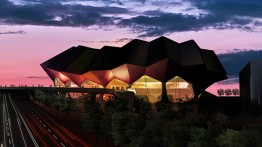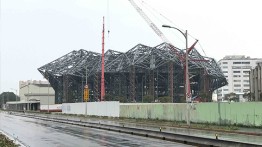Lunchtime Lecture | Reiser + Umemoto, RUR: Projects and Their Consequences
Tuesday, October 24, 2017, 12 - 2pm
Reiser + Umemoto's work is best understood not as a series of standalone projects, but rather as connected to a set of sustained inquiries across built and unbuilt proposals, which address a wider set of generational concerns ranging from multiple definitions of site -- social, political and cultural – to material logics scaling from the body to the infrastructural.
The lecture presents RUR's design process as successive, inheriting and returning projects from the wider field, either exhausting their possibilities or initiating new offspring. The individual artifacts, their achievement and failure (and failure is important), comprise an overall project in architecture. "If you are not surprised by what you do, why do it?" as Peter Cook has said. When successful, architecture captures the paradox of being both impersonal and highly authored at the same time.
Reiser + Umemoto, RUR Architecture DPC is an internationally recognized multi-disciplinary design firm with built projects across a wide range of scales. The firm's winning proposals for both the Taipei Pop Music Center and the Kaohsiung Port Terminal are now under construction in Taiwan, while O-14, a 22-story exoskeletal office tower in Dubai, was completed in 2012 and has received numerous international honors. A comprehensive monograph of the building, entitled O-14: Projection and Reception, was released in 2013 in collaboration with AA Publications.
The work of Reiser + Umemoto has been published and exhibited widely; the firm was awarded the Chrysler Award for Excellence in Design in 1999, and Jesse Reiser and Nanako Umemoto received the Academy Award in Architecture by the American Academy of Arts and Letters in 2000. Reiser + Umemoto published the Atlas of Novel Tectonics in 2006, and released the Japanese version in 2008. In May of 2008, they were awarded the Presidential Citation from President George Campbell of the Cooper Union for outstanding practical and theoretical contributions to the field of Architecture, and in April 2011, they were honored with the John Hejduk Award, also from the Cooper Union. Recently Jesse Reiser and Nanako Umemoto were the recipients of the USA Booth Fellowship from United States Artists for Architecture & Design in 2012.
Jesse Reiser is a Professor of Architecture at Princeton University and has previously taught at various schools in the US and Asia, including Columbia University, Yale University, Ohio State University, Hong Kong University, and has lectured widely at various educational and cultural institutions throughout the United States, Europe and Asia. He was a fellow of the American Academy in Rome in 1985 and is a recipient of an honorary fellow from University of Tokyo in 2014.
Nanako Umemoto is a principal of RUR Architecture DPC. She has taught at various schools in the US, Europe and Asia, including Harvard University, the University of Pennsylvania, Columbia University, EPFL in Lausanne Switzerland, Hong Kong University, Kyoto University, and the Cooper Union. Nanako has lectured widely at various educational and cultural institutions throughout the United States, Europe and Asia.
Refreshments will follow in the School of Architecture Lobby. This event is open to current Cooper Union students, faculty and staff. Room 315F.
Located at 7 East 7th Street, between Third and Fourth Avenues






